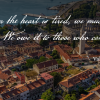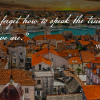
Published: January 15, 1999
View the Original Newsletter: Iskra-26.pdf
About This Issue
Iskra No. 26 opens 1999 with a deeply introspective editorial by Valentina Krčmar, addressing Croatia’s growing pains as it transitions from war to democracy. The issue balances political commentary, community updates from Toronto, cultural essays, and reflections on unity, morality, and the challenges of rebuilding a young nation. It’s a call to remember the sacrifices that built Croatia and a warning against the dangers of apathy and forgetfulness.
Editorial: “How Quickly We Forget”
In her lead essay, Valentina Krčmar writes candidly about a conversation with a young man who claimed that Croatia’s war “was fought so some people could get rich.” His comment shocks her, prompting a passionate reflection on collective memory and national gratitude.
She warns that Croatians are forgetting the reasons they fought — for survival, freedom, and identity — not for personal gain. Valentina recalls the early days of the Homeland War, when Croatia’s survival was uncertain and ordinary citizens defended their homes with courage and faith.
She argues that democracy is fragile and must be nurtured with honesty and accountability, not resentment or greed. Her essay closes with a powerful reminder:
“The truth will set you free — but democracy will only guide you forward if you remain honest.”
From Toronto: Winter Reflections and Community Spirit
Valentina’s Toronto column paints a vivid picture of a snow-covered city struggling with an unexpected storm. Amid the chaos, she shares moments of joy — the beauty of glistening snow, the laughter of neighbors, and the comfort of belonging.
She recalls attending the 25th anniversary celebration of Sister Nevena, a beloved member of the Parish of the Croatian Martyrs. Surrounded by priests, nuns, and community members, Valentina reflects on the warmth and unity that faith continues to inspire among Croatian-Canadians.
Motrišta: Lessons from the Past
Through essays and reader letters, this issue explores accountability in leadership and the moral direction of post-war Croatia. Contributors emphasize that while the HDZ movement (Croatian Democratic Union) united the nation during war, true democracy requires transparency and equality before the law.
One column urges citizens to remember that corruption and indifference betray the sacrifices of those who died defending Croatia. Another calls for the reform of banking and privatization policies, demanding fair treatment for workers and small business owners.
Voices from the Readers
In a new section titled Letters from Our Readers, Iskra publishes commentaries and reflections from Croatians both at home and abroad.
Highlights include:
-
“Has Croatia’s Leadership Made an Unforgivable Mistake?” — A letter by Josip Mioč arguing that the government missed an opportunity to repatriate hundreds of thousands of Croats after the war, leaving rural areas depopulated.
-
“Croatian Serbs Do Not Exist” — A controversial opinion by Zlatko Hajdinjak, condemning the idea of dual ethnic identity and warning against renewed Serbian influence in Croatia.
Both letters illustrate the diversity of voices and intensity of debate within the diaspora community.
From Croatia: News and Developments
Prepared by Slavko Butković, this section summarizes key political and social events from early January 1999:
-
Vice Premier Ljerka Mintas-Hodak criticizes statements by UN war crimes prosecutor Louise Arbour as “inappropriate and biased.”
-
Fikret Abdić, a former Bosnian leader, faces an arrest request from the Sarajevo Federal Ministry of Interior for alleged war crimes.
-
NATO’s SFOR agrees to return confiscated weapons to the HVO (Croatian Defence Council) after political tensions in Bosnia and Herzegovina.
-
Croatian veterans’ associations protest against SFOR’s intervention, calling it discriminatory toward Croats in Bosnia.
Croatian Culture and Heritage
This issue celebrates the preservation of Croatian literary traditions through features on regional almanacs and cultural publications:
-
A historical overview of Slavonian folk calendars and the evolution of regional print culture from the 18th century.
-
A tribute to the “Hrvatski Kajkavski Kolendar”, edited by Dr. Zvonimir Bartolić, highlighting its role in promoting the Kajkavian dialect and regional identity.
Arts and Poetry
A beautiful section honors Ivan Lacković Croata, the renowned naïve artist, whose exhibition of drawings from 1957–1971 opened in Zagreb’s Academy of Arts and Sciences. The article celebrates his devotion to memory and detail, calling him “the greatest draftsman among naïve artists in the world.”
Sports
The sports roundup reports Croatia’s vibrant athletic scene at the start of 1999:
-
Goran Ivanišević begins the season with a win at the Doha ATP tournament.
-
Cibona Zagreb defeats Pau-Orthez in the EuroLeague.
-
Janica Kostelić earns early praise as a rising star in skiing.
-
The Croatian Olympic Committee announces nominees for best athletes of 1998, including Tatjana Bogos, Davor Šuker, and the Croatian national soccer team.
-
A heartfelt note mentions Croatian detainees in The Hague sending congratulations to NK Croatia for their victory over Ajax Amsterdam — a touching gesture of solidarity from afar.
Closing Thoughts
Iskra No. 26 captures a nation at a crossroads — grateful for its freedom yet struggling with disillusionment. Through Valentina Krčmar’s editorial voice and the passion of its contributors, this issue reaffirms that the soul of Croatia depends not on politics but on memory, honesty, and love of country.




